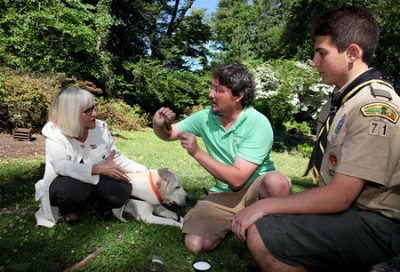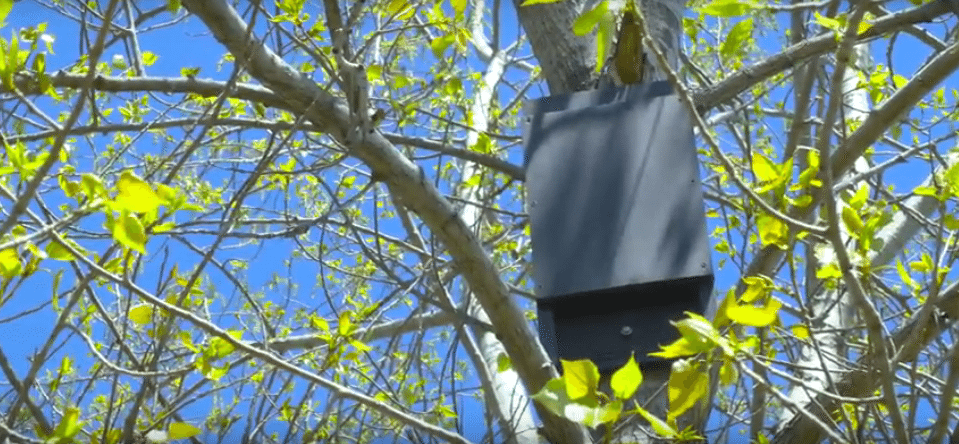
In an effort to reduce the population of disease-carrying mosquitoes, the Town of North Hempstead (TONH) has installed bat houses in local parks—Manorhaven Beach Park, Harbor Links Golf Course, Clark Botanic Garden, Plandome Pond Park, Whitney Pond Park and Hempstead Harbor Trail. The town plans to add more with the help of Boy Scouts.
The bat houses will encourage the population growth of brown bats on Long Island, which, in turn, will help reduce the mosquito population, without spraying pesticides harmful to insects, birds, humans and other life.
Learn more about bats in Episode 5 of the TONH series Off The Trail with Ranger Powers. At the 7-minute mark, he demonstrates how to build a bat house for your backyard:
“In the Town of North Hempstead, we are trying to promote alternative methods to control pesky and disease-born insects,” said Town Supervisor Judy Bosworth. “Bat boxes provide an ecologically safe approach to controlling mosquitoes and other pests in our parks.”
Bats are the main predators of insects like moths and mosquitoes in the northeast. According to the Center for Biological Diversity, an estimated 6.7 million bats have died nationwide due to white-nose syndrome, the result of a fungus called Pseudogymnoascus destructans that invades and ingests the skin of hibernating bats.
Carole Trottere, director of communications for TONH, said that the disease affected cave-dwelling bats on Long Island, but the non-cave-dwelling brown bat population is reasonably stable.
Residents can do their part by introducing bat boxes to their property. Ranger Eric Powers, host of Off The Trail, encourages residents to easily build their own with a pieces of scrap wood (see video above) and hang in a tree.

“These little bats are very small, but very efficient at eating flying insects,” Powers stated.
“Especially with the Zika virus, it’s comforting to know that these bats actually do a lot to control the insect populations, but in a natural way, without using chemical poisons,” Bosworth stated.
Long Island has a history of using chemicals specifically designed to kill mosquitoes, but then having disastrous effects with the wildlife, Powers said. DDT killed off many songbirds and caused harm to eagles and osprey.
Kevin Braun, TONH’s environmental control specialist and a proponent of bat houses, believes providing a home for bats will lead to more bats and fewer mosquitoes. He noted that other state parks, including Hither Hills in Montauk, have installed bat boxes with success.
Residents need not fear an increase in the bat population. According to the Bureau of Land Management, bats do not contract rabies any more frequently than other wild animals, such as foxes skunks or raccoons.
In addition to reducing pest populations, “bats are beneficial wildlife and help maintain our delicate balance of nature,” Powers said. “The mosquito-eating services that bats provide far outweigh the potential risks, and their waste is a highly effective fertilizer for your garden.”
Spokesman Jostyn Hernandez said, “The Town of Hempstead has no plans at this time to employ the use of bat houses.” He also noted that the species responsible for spreading of the Zika virus “lives in tropical, subtropical and in some temperate climates and has not been found in Nassau County or New York State according to several medical experts.”
Hernandez explained, “The Nassau County Department of Public Works, in consultation with the Health Department, manages and executes a mosquito management program to prevent and control the spreading of viruses carried by mosquitoes in our area.”
A spokesperson for the Town of Oyster Bay Environmental Department said, “At this time, there is no plan to install bat houses.” They added, “It is something we can consider as we move forward.”
On Aug. 4, the county treated parts of South Shore salt marshes by helicopter to control mosquito larvae.
The Town of North Hempstead uses essential oils, such as rosemary and citronella, and insecticidal soaps to spray for pests.
Residents should practice basic maintenance of their property to make it inhospitable to mosquitoes. “Since mosquitoes can lay their eggs in any stagnant water, it is best to keep any backyard pond moving with a waterfall or fountain,” Powers said. “Check your property regularly for standing water, such as in children’s toys, tarps and uncleaned gutters.”


















